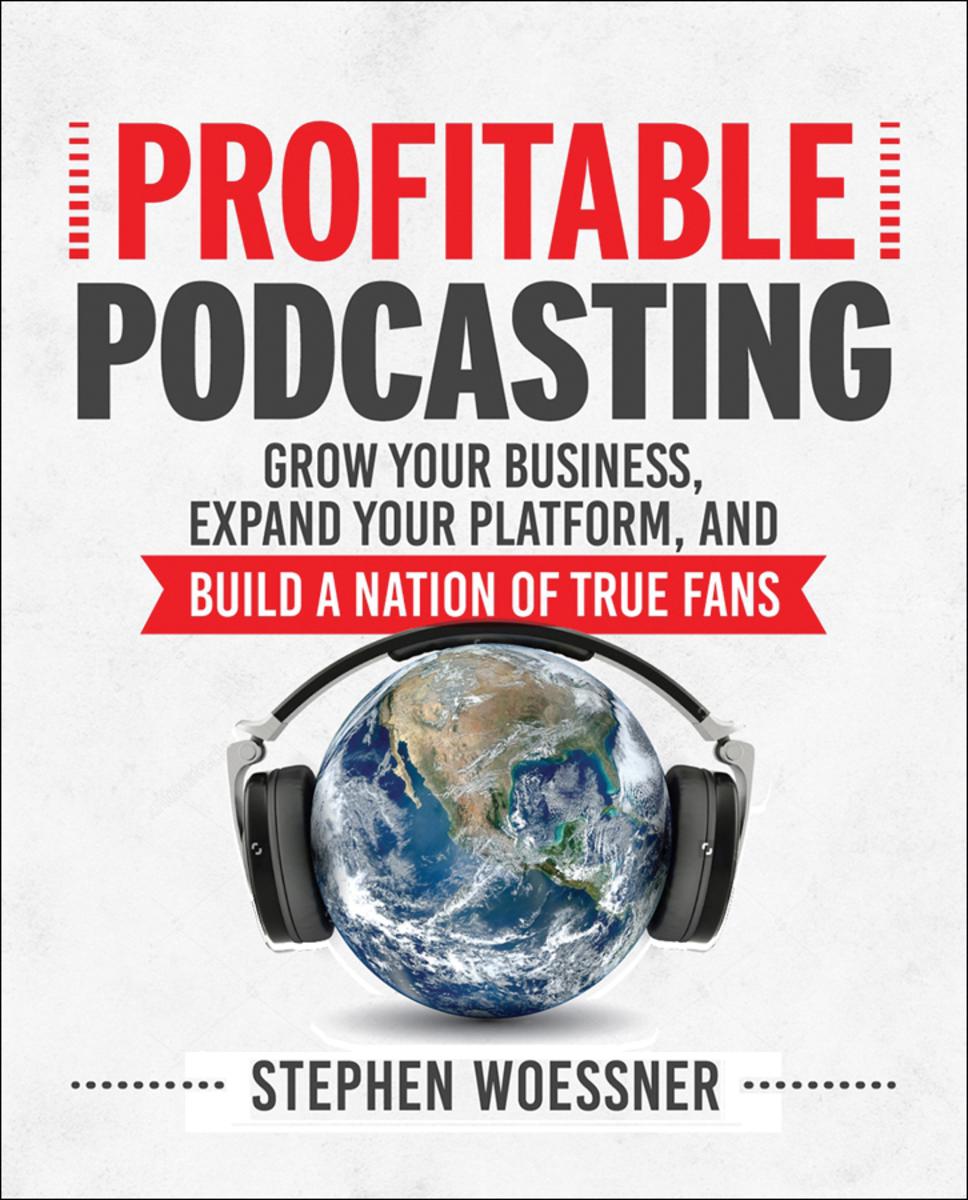 Profitable Podcasting: Grow Your Business, Expand Your Platform, and Build a Nation of True Fans—look, I really, really didn’t enjoy reading this book, and before I get into why I’m glad I did anyway, I just want to get all this pent up bullshit out of the way. I was rolling my eyes through about 70% of the book and I’ve got a lot I want to get off my chest. I’ll admit, my complaints here are basically cosmetic. But, they’re cosmetic complaints the same way complaints about a car salesperson’s tactics are cosmetic. At some point you just want them to shut up about about how the car will make you feel and get to negotiating financing.
Profitable Podcasting: Grow Your Business, Expand Your Platform, and Build a Nation of True Fans—look, I really, really didn’t enjoy reading this book, and before I get into why I’m glad I did anyway, I just want to get all this pent up bullshit out of the way. I was rolling my eyes through about 70% of the book and I’ve got a lot I want to get off my chest. I’ll admit, my complaints here are basically cosmetic. But, they’re cosmetic complaints the same way complaints about a car salesperson’s tactics are cosmetic. At some point you just want them to shut up about about how the car will make you feel and get to negotiating financing.
Now, before I settle into my cynical, cathartic tangent, I read this book for two reasons. First, I get asked about podcasting, I feel, a lot for someone who has never hosted, planned, launched, promoted, or even listened to all that many podcasts. Since I’m definitely going to tell people what I think when asked, I thought I should probably read up a bit so I could back up my assumptions with, at least, some basic research. The second reason I read this book is because perhaps a podcast is on the horizon for me, and I like to know what I’m stepping into.
Okay, tirade.
One day Woessner used the phrase a “nation of true fans” and then slowly slipped into insanity. He uses “true fan” 69 times in the pages of this book… it’s not a long book. It’s like Dora the Explorer restating the same thing again and again and again because she knows children are still stupid. It’s not an especially substantive term, either. It’s meaning in the book is flexible. It seems on one page it might mean someone who loves what you do so much they would kill for you, and on the next page it might just kind of mean someone who’s open to listening to you talk about some product you’re endorsing. It’s a branding gimmick, and maybe a bit of ‘writing for the algorithm, rather than the reader’, and that’s probably part of what puts me off so much.
The first seven chapters are just heavy padding, and bring almost nothing new to the discussion of your podcast or even podcasting. He’s trying to build some ethos around the concept of hosting a podcast. Those first seven chapters basically distill into just two points:
- Hosting a podcast can be an excellent way to network, and
- podcasting is really hard, but also very easy, you’ll have to learn how to do it, but you better not mess it up, just definitely go for it, but you’ll probably fail, trust me, it’s easy, but it’s really hard, so read the rest of the book.
I’m being hyperbolic; reading through these parts was just such a chore.
The style in general reminds me of the self-improvement and positive-thinking books from the 90’s. Just rife with tacky catch phrases, and long winded explanations about things you could figure out yourself from a well ordered bulleted list. The first half of it reads as though the author thinks you’re having trouble understanding what he’s explaining… but it’s just not complicated.
But then chapter 8 hits and there’s finally some meat under all this fat soaked cartilage.
Chapter 8 finally introduces some preproduction considerations that really would probably take a year of trial and error to figure out. These are questions about branding, goals, categorizations and expectations. I’m usually a big dive-in-and-figure-it-out kind of guy but some of these topics, such as what kind of metrics to start tracking right away, really probably make a significant difference between the podcast that ends in 6 months and one that ultimately ‘makes it’.
Chapter 9 gets pretty close and personal about how podcast guests should be treated to make sure they have a good experience and want to help you promote the show. The author lays out a series of recommended email communications and ‘on-boarding’ procedures for new guests. This whole chapter is really based on Woessner’s ‘Onward Nation’ podcast, and I felt more could be said about less ‘goal oriented’ podcast guests; what if someone isn’t selling anything? This discussion about guest hospitality is clearly geared toward those who plan to have a lot of guests, but I think it’s good to have a mental picture of efficiency before you’re ready to scale.
Chapter 10 covered intros, interludes and outros. As someone who listens to podcasts, this chapter seemed self explanatory. You don’t want too long of an intro, and you don’t want one too short. One point he made though which wouldn’t be obvious is that you want to make a habit of pausing for silence for a moment in the middle of the podcast, which allows for an advertisement or some other interluding segment. “You can always take silence away, but it’s hard to add back in”.
Chapters 11 and 12 were not useful to me, but they probably would be to others. They deal with web presence and social media. I already have mechanisms for handling those things, but most people don’t. Woessner recommends a promotional blast for each episode, sometimes pushing nearly a dozen calls to action over social media and subscribers. Depending on your audience, that might be a little… much. But that’s for you to decide; don’t pull social media strategies directly out of books.
Chapter 13 is probably what I was after all along. Gear, equipment, software, technical considerations. Woessner doesn’t get especially specific in his equipment recommendations. The extent of it is basically, don’t use the computer’s built in microphone. I thought I wanted to know what device he’d recommend, but I took his silence to mean basically anything that sounds pretty good. He does recommend software though. Skype, for phone interviews, Adobe Audition for Editing, and something called CallRecorder for recording the calls through Skype—though some of those recommendations came earlier in the chapters on social media.
In chapter 14 Woessner shares some really valuable information regarding finally launching the podcast, and makes a good case for why you want to have your ducks in a row before you do. One of the most important pieces of advice was that if you’re doing a podcast daily or weekly, you need to have a few of them stored up before you actually launch. You only get so much time on the ‘new and noteworthy’ lists, and consistency is one of the most important parts of a podcast’s early success. If you publish too early and then take a six week sabbatical, you’re going to have an uphill battle when you get back.
Chapter 15, dealing with the nebulous task of hosting, was interesting to read, but I feel perhaps kind of futile. The most important take away is that if you’re hosting a podcast with a guest, it’s important to put the spotlight on the guest much of the time. Beyond that though, trying to act on his specific advice would probably just make you a more self-conscious version of yourself. I tend to think those kinds of skills take time and I think you need to just be bad at them for a while while you keep trying.
Chapter 16 and 17 were basically throw aways, though Chapter 16 puts an interesting spin on the concept of corporate sponsorships. Unfortunately, there’s not really enough information there to actually carry you anywhere. Chapter 17 was about finding good unpaid interns, which is just an obnoxious corporate phenomenon to begin with. Also, Woessner calls all of his interns ‘rock stars’ and every time, it sounds like he’s shilling for some megachurch somewhere.
Am I being too critical of some business-growth book by a mostly unknown entrepreneur just trying to share some advice and make a buck? Yes, probably. But dammit, I gave this book like 4 hours of my life and I want to complain about it. I kid, but the truth is, I don’t want to recommend this book to my aspiring podcast friends, because reading it felt redundant, and almost as though I was being talked down to. But after the bullshit I took many a-petty issue with, I did find much of what I was looking for when I picked it up in the first place. And, I have found no better source of information that touches on everything. So, I will recommend it when asked.
If you’re thinking of starting a podcast, and especially if that podcast is an accessory to some other endeavor you’re pursuing, reading this book is probably going to help set you up on better ground than if you just dive in. Ultimately, it’s not a super long book. The chapters are short, and frankly, unless you’ve never read a book about marketing or networking before, you can skip the first 7 chapters altogether.

Recent Discussion